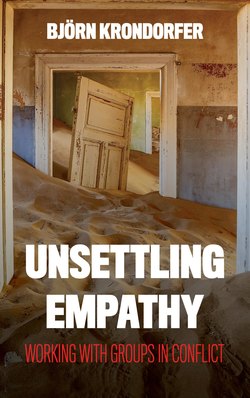Читать книгу Unsettling Empathy - Bjorn Krondorfer - Страница 4
На сайте Литреса книга снята с продажи.
Introduction
ОглавлениеWorking with Groups in Conflict
As human beings inhabiting this planet, we have responsibilities toward each other and toward the earth we share. But as we are inescapably pushed with our backs into the future, facing the rubble of history piled on top of earlier rubbles, our ability to respond responsibly is diminishing. More often than not, we are reacting, not responding. More often than not, we are defending, not embracing. We become closed off, not welcoming. We retreat into fear and lose trust in those with whom we live in proximity. We yearn for safety and end up imprisoning ourselves in enclaves of sameness, which divide the world into those we believe to be friendly and those we deem dangerous. And the rubble of history seems to prove us right, for we all claim our own particular pile, and we imagine ourselves, each in our enclave, to be reasonably secure.
But we are not. In a double sense. Neither are we sheltered in our enclaves of sameness nor are we bound to the dictates of history that abdicate our responsibility to be responsive to the other. This book is about responsibility: what it takes to become responsible toward each other, how we might approach such a task, and why embracing a relational vision of a practice of care releases us from the restraints of our enclaves of sameness. To adopt a caring responsibility toward each other, we need to become unsettled by empathy.
Walter Benjamin’s Angel of History, to whom I am alluding above, is steeped in a melancholic view of progress.[1] In Benjamin’s image, the Angel of History is blown by a storm from Paradise toward the future, with his face not looking forward but backward, gazing at a single catastrophe of an ever-growing pile of rubble, a storm so strong that the angel cannot close his wings or pause for a moment to repair “what has been smashed.” “This storm,” Benjamin concludes, “we call progress.”[2] Indeed, we are currently living in a moment of history when the relative safety promised by progress in the form of liberal democracies—albeit a safety ensured on the backs of impoverished, tormented, displaced, and colonized peoples—has become fragile and endangered, so much so that we might fall into a melancholic state of helplessness. What we have assumed to be stable, lasting, and secure is threatening to fall apart. Like the Angel of History, who cannot close his wings, we might feel rather helpless as the storm blows our way.
We are not, however, the Angel of History who, from a metahistorical perspective, can afford such melancholia. The German Jewish philosopher Walter Benjamin writes: “Where we [humans] see the appearance of a chain of events, he [the Angel of History] sees one single catastrophe, which unceasingly piles rubble on top of rubble.”[3] To behold all the agonies of the past as “one single catastrophe” is the sole privilege of the Angel of History. It is not ours to claim. Benjamin knew this in the bone-chilling manner of someone faced with only bad choices. Threatened with deportation at the Spanish border when escaping Nazism in 1940, he committed suicide rather than be returned to Germany. When humans adopt the angel’s metahistorical view, it smacks of philosophical fatalism and moral aloofness, for we would willingly refuse to distinguish between culpable wrongdoing and the all-too-real experience of human suffering. We would abdicate our responsibility toward justice. As opposed to the Angle of History, humans are confronted with specific events that have produced “rubble on top of rubble,” and these events demand a response from us.
Not only are we not the singular Angel of History, we are also not angels in general. The storm that is blowing from paradise is not paradise itself but rather a reminder of our loss of innocence. As the storm grows stronger and we seek shelter in our enclaves of sameness, we tend to believe in the innocence of our own communities while perceiving ourselves as under attack by malevolent outsiders.[4] Not being angels ourselves implies that we must acknowledge the loss of innocence also in our midst, for it is this awareness that calls us into responsibility toward each other.
Being humans, not angels, has its advantages. In Benjamin’s image, the Angel of History “would like to linger for a moment,[5] to awaken the dead and to piece together what has been smashed”; but he cannot linger because the storm pushes him relentlessly forward, with his gaze fixed on the debris he cannot do anything about. As humans, however, we can: we can linger or ignore; we can remember the dead or be haunted by them; we can inflict wounds or repair harm. We have choices. We can imagine. We can relate. We can care.
Even when we are apprehensive about the future because of the debris of the past, we need to make choices. Doing so, we embrace our human agency. When conflicts feed resentments and hostilities, we need to be cognizant of levels of culpability, complicity, and victimization and to acknowledge acts of resilience and survival. We need to assess the politics of memory and moral emotions, probe personal motivations, and open ourselves up to sincere self-questioning.
When groups in conflict engage in reconciliatory processes, they are taking on a responsibility toward just relations, tasked with developing relationships of trust even when justice is not yet attained. Investing in a relational practice of empathy, we keep an eye on the past while directing our gaze toward future generations. When acknowledging past traumatic events, we must do so without retraumatizing new generations: our children and children’s children deserve not to be overdetermined by communally enshrined memories.
